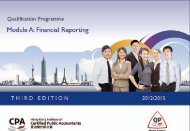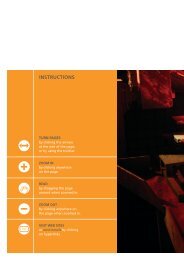MAGAZINE - Realview
MAGAZINE - Realview
MAGAZINE - Realview
You also want an ePaper? Increase the reach of your titles
YUMPU automatically turns print PDFs into web optimized ePapers that Google loves.
NEWS<br />
“Green shoots” wake corporate predators<br />
Corporate directors would do well to prepare for a rise in unsolicited takeover offers.<br />
NEW YORK: There may be signs of so-called “green shoots”<br />
in the economy, but one of them does not necessarily bode well<br />
for all boards of directors. Indeed, a sharp rise in unsolicited<br />
takeover offers in the US means many may now have to confront<br />
the very real disruption and distraction that results from a<br />
predatory threat to ownership.<br />
Hostile offers accounted for 47 per cent of the M&A transactions<br />
that took place in the United States during the first<br />
few months of 2009, compared with 24 per cent in all of 2008<br />
and just 7 per cent in 2004, according to a report from the<br />
Conference Board Governance Center (CBCC).<br />
“Today’s market conditions permit some companies to be<br />
‘put in play’ more easily than before,” said the author of the<br />
report, Frederick Alexander.<br />
The concern particularly applies to companies with undervalued<br />
stock prices, surplus assets or constrained performance<br />
– often resulting from short-term liquidity issues – that invite bargain-hunting<br />
by acquirers capable of obtaining financing or using<br />
their equity currency to pursue growth opportunities.<br />
“Over the past few years, in response to pressures from<br />
proxy advisory groups and activist shareholders, some of those<br />
companies have reduced their structural takeover protections<br />
by repealing poison pills and declassifying boards, and may<br />
now be particularly vulnerable,” Alexander said.<br />
The report, titled The role of the Board in Turbulent Times:<br />
Responding to Unsolicited takeover Offers, encourages directors<br />
to become familiar with the corporation’s governance profile<br />
and the tactics that can be used to protect shareholders’ interests<br />
from opportunistic behaviours in the marketplace.<br />
“The tactics discussed in the report are not about thwarting<br />
unsolicited offers,” Alexander emphasised. “They are about<br />
ensuring that directors are given enough time to fulfil their fiduciary<br />
obligations and obtain the information necessary to<br />
make a rational business decision with respect to the offer, as<br />
well as to explore all alternatives.”<br />
Recommendations in the report include: reviewing existing<br />
organisational (charter and bylaws) provisions; monitoring shareholder<br />
base and intentions; maintaining proactive external relations;<br />
and understanding how investors and gatekeepers<br />
(proxy advisors and governance rating agencies, in particular)<br />
could perceive and react to possible amendments to the company’s<br />
governance profile.<br />
IT risk solution for pandemic<br />
The alarming spread of so-called Swine Flu has prompted one software developer to adapt<br />
an existing governance, risk and compliance solution to help organsiations better maintain<br />
business continuity in face of the pandemic.<br />
NEW YORK: US-based Modulo, a provider of<br />
IT governance, risk and compliance solutions,<br />
has adapted its software product, Modulo Risk<br />
Manager, to help private and public institutions<br />
deal with the current Swine Flu pandemic.<br />
Modulo Risk Manager was first applied in a<br />
pandemic-like scenario when it was implemented<br />
by one of Brazil’s biggest banks, Banco Real<br />
(part of Santander Group), during the Avian Flu<br />
outbreak in 2006. The software was adopted as<br />
a tool for internal risk management and a solution<br />
was developed to support the necessary decisions<br />
in the event of wholesale contamination.<br />
Essentially, it automates the process required<br />
for minimising the risks of contamination through<br />
providing checklists, graphs, and maps in order<br />
to prevent and protect a business and its customers<br />
from potential damages and resulting<br />
losses, thereby helping protect organisations<br />
from the impact of possible epidemic scenarios<br />
and providing business continuity solutions.<br />
“In the case of the contamination threat of influenza<br />
A, organisations which adopt a preventative<br />
strategy together with good business practices,<br />
can return to their core activities much more<br />
quickly after a crisis situation,” said Modulo cofounder<br />
Alvaro Lima.<br />
“Unfortunately, many organisations cannot<br />
return quickly and effectively to their activities<br />
after such a global crisis.”<br />
“In the case of the<br />
contamination threat<br />
of influenza A,<br />
organisations which<br />
adopt a preventative<br />
strategy together with<br />
good business practices,<br />
can return to their<br />
core activities much<br />
more quickly after a<br />
crisis situation”<br />
8 RISK August 2009

















